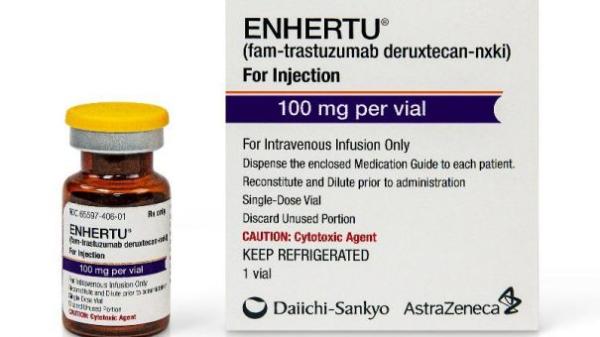Enhertu Disease Interactions
There are 3 disease interactions with Enhertu (fam-trastuzumab deruxtecan).
Fam-trastuzumab deruxtecan (applies to Enhertu) cardiac disease
Moderate Potential Hazard, Moderate plausibility. Applicable conditions: Heart Disease
Patients treated with fam-trastuzumab deruxtecan may be at increased risk of developing left ventricular dysfunction. Treatment with fam-trastuzumab deruxtecan has not been studied in patients with a history of clinically significant cardiac disease or LVEF less than 50% prior to initiation of treatment. Assess LVEF prior to initiation of treatment and at regular intervals during treatment as clinically indicated. Manage LVEF decrease through treatment interruption. Permanently discontinue fam-trastuzumab deruxtecan if LVEF of less than 40% or absolute decrease from baseline of greater than 20% is confirmed. Treatment should be permanently discontinued in patients with symptomatic congestive heart failure (CHF).
Fam-trastuzumab deruxtecan (applies to Enhertu) hepatic impairment
Moderate Potential Hazard, Moderate plausibility. Applicable conditions: Liver Disease
Fam-trastuzumab deruxtecan has not been studied in patients with severe hepatic impairment (total bilirubin >3 to 10 times ULN and any AST). No dose adjustment is required in patients with mild (total bilirubin =ULN and any AST >ULN or total bilirubin >1 to 1.5 times ULN and any AST) or moderate (total bilirubin >1.5 to 3 times ULN and any AST) hepatic impairment. However, closely monitor patients with moderate hepatic impairment, due to potentially increased exposure, and possible increase of related toxicities.
Fam-trastuzumab deruxtecan (applies to Enhertu) severe renal impairment
Moderate Potential Hazard, Moderate plausibility. Applicable conditions: Renal Dysfunction
Fam-trastuzumab deruxtecan has not been studied in patients with severe renal impairment. Caution is advised if used in these patients. No dose adjustment is required in patients with mild (creatinine clearance (CrCl) =60 and <90 mL/min) or moderate (CrCl =30 and <60 mL/min) renal impairment.
Switch to professional interaction data
Enhertu drug interactions
There are 180 drug interactions with Enhertu (fam-trastuzumab deruxtecan).
More about Enhertu (fam-trastuzumab deruxtecan)
- Enhertu consumer information
- Check interactions
- Compare alternatives
- Pricing & coupons
- Reviews (36)
- Drug images
- Side effects
- Dosage information
- During pregnancy
- FDA approval history
- Drug class: HER2 inhibitors
- En español
Related treatment guides
Drug Interaction Classification
| Highly clinically significant. Avoid combinations; the risk of the interaction outweighs the benefit. | |
| Moderately clinically significant. Usually avoid combinations; use it only under special circumstances. | |
| Minimally clinically significant. Minimize risk; assess risk and consider an alternative drug, take steps to circumvent the interaction risk and/or institute a monitoring plan. | |
| No interaction information available. |
See also:
Further information
Always consult your healthcare provider to ensure the information displayed on this page applies to your personal circumstances.


